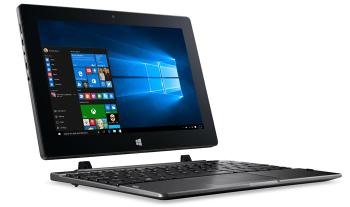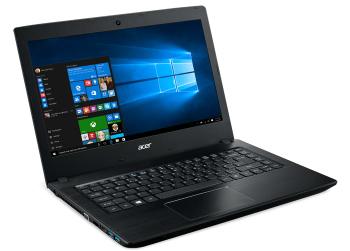Acer has unveiled a range of new laptops and 2-in-1s, all featuring fingerprint readers, ahead of the Computex 2016 exhibition. Microsoft's Windows 10 embraces biometric security with Windows Hello, allowing users to conveniently and securely sign into devices, making a built-in fingerprint reader an attractive addition. Such added security and convenience doesn't have to cost a lot extra, as Acer demonstrates with this range starting at $199. At the time we don't have full specifications of these devices such as exact processors used, RAM and storage capacities.
Acer's Switch One 10 is a budget-friendly 2-in-1 tablet convertible. This machine is based upon the quad-core Cherry Trail Intel Atom processors for a good balance between performance, battery life, and cost. The display on this device is described as 'HD' but uses an IPS panel for wide viewing angles. Users benefit from dual cameras, a precision touchpad, multi-mode operation and up to 8 hours of battery life.
The Acer Switch One 10, pictured above, will become available from July, in black, white, red, and peacock or navy blue, priced starting at $199.
The new Acer Switch V 10 2-in-1 integrated a USB Type-C port to facilitate "fast data transfer, high-resolution video output and convenient charging," says the Microsoft Windows Experience blog. Other key features of this Cherry Trail powered 2-in-1 include; a 10.1-inch IPS touch display protected by Gorilla Glass, up to 9 hours of battery life, dual-cameras, 802.11ac Wi-Fi, and a precision touchpad. As you can see in the photos above, the Switch V detachable hinge mechanism allows for all sorts of usage scenarios.
Acer will make the Switch V 10 later this year, in the colours shown above, starting at $249.
Last but not least Acer announced the new TravelMate P2 series, pictured below. The series includes the TravelMate P249 and TravelMate P259 with 14-inch and 15-inch Full HD screens. These are much more powerful than the above 2-in-1s as they come equipped with Intel's 6th gen Core CPUs, DDR4 RAM, and Nvidia GeForce 940M graphics.
Augmenting the aforementioned fingerprint security Acer equips Trusted Platform Module (TPM2.0) hardware-based encryption keys to help secure your data, e-mail, and user credentials plus Acer ProShield authentication and security software.
Acer will make the new TravelMate P2 series available starting later this year, priced from $599.










